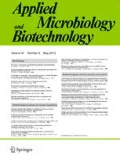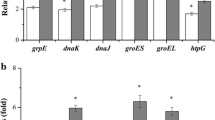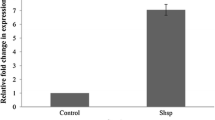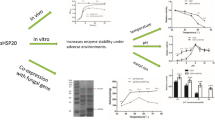Abstract
In this study, stress tolerance devices consisting of heat shock protein (HSP) genes from thermophiles Geobacillus and Parageobacillus were introduced into riboflavin-producing strain Bacillus subtilis 446 to improve its stress tolerance and riboflavin production. The 12 HSP homologs were selected from 28 Geobacillus and Parageobacillus genomes according to their sequence clustering and phylogenetically analysis which represents the diversity of HSPs from thermophilic bacillus. The 12 HSP genes and 2 combinations of them (PtdnaK-PtdnaJ-PtgrpE and PtgroeL-PtgroeS) were heterologously expressed in B. subtilis 446 under the control of a strong constitutive promoter P43. Most of the 14 engineered strains showed increased cell density at 44 to 48 °C and less cell death at 50 °C compared with the control strains. Among them, strains B.s446-HSP20-3, B.s446-HSP20-2, and B.s446-PtDnaK-PtDnaJ-PtGrpE increased their cell densities over 25% at 44 to 48 °C. They also showed 5-, 4-, and 4-fold improved cell survivals after the 10-h heat shock treatment at 50 °C, respectively. These three strains also showed reduced cell death rates under osmotic stress of 10% NaCl, indicating that the introduction of HSPs improved not only the heat tolerance of B. subtilis 446 but also its osmotic tolerance. Fermentation of these three strains at higher temperatures of 39 and 43 °C showed 23–66% improved riboflavin titers, as well as 24-h shortened fermentation period. These results indicated that implanting HSPs from thermophiles to B. subtilis 446 would be an efficient approach to improve its stress tolerance and riboflavin production.




Similar content being viewed by others
References
Amillastre E, Aceves-Lara CA, Uribelarrea JL, Alfenore S, Guillouet SE (2012) Dynamic model of temperature impact on cell viability and major product formation during fed-batch and continuous ethanolic fermentation in Saccharomyces cerevisiae. Bioresour Technol 117:242–250. https://doi.org/10.1016/j.biortech.2012.04.013
Bao FM, Gong L, Shao WL (2008) Cloning, sequencing and analysis of dnaK-dnaJ gene cluster of Bacillus megaterium. J Basic Microbiol 48(6):448–454. https://doi.org/10.1002/jobm.200800116
Bayne-Jones S, Rhees HS (1929) Bacterial calorimetry II. Relationship of heat production to phases of growth of bacteria. J Bacteriol 17(2):123–140
Camacho C, Coulouris G, Avagyan V, Ma N, Papadopoulos J, Bealer K, Madden TL (2009) BLAST+: architecture and applications. BMC Bioinformatics 10:421. https://doi.org/10.1186/1471-2105-10-421
Davidson JF, Whyte B, Bissinger PH, Schiestl RH (1996) Oxidative stress is involved in heat-induced cell death in Saccharomyces cerevisiae. Proc Natl Acad Sci U S A 93(10):5116–5121. https://doi.org/10.1073/pnas.93.10.5116
De Marco A (2007) Protocol for preparing proteins with improved solubility by co-expressing with molecular chaperones in Escherichia coli. Nat Protoc 2:2632–2639. https://doi.org/10.1038/nprot.2007.400
De Marco A, Deuerling E, Mogk A, Tomoyasu T, Bukau B (2007) Chaperone-based procedure to increase yields of soluble recombinant proteins produced in E. coli. BMC Biotechnol 7:32. https://doi.org/10.1186/1472-6750-7-32
Dunlop MJ (2011) Engineering microbes for tolerance to next-generation biofuels. Biotechnol Biofuels 4:32. https://doi.org/10.1186/1754-6834-4-32
Dunlop MJ, Dossani ZY, Szmidt HL, Chu HC, Lee TS, Keasling JD, Hadi MZ, Mukhopadhyay A (2011) Engineering microbial biofuel tolerance and export using efflux pumps. Mol Syst Biol 7. https://doi.org/10.1038/msb.2011.21
Endo A, Sasaki M, Maruyama A, Kurusu Y (2006) Temperature adaptation of Bacillus subtilis by chromosomal groEL replacement. Biosci Biotechnol Biochem 70(10):2357–2362. https://doi.org/10.1271/bbb.50689
Ezemaduka AN, Yu JY, Shi XD, Zhang KM, Yin CC, Fu XM, Chang ZY (2014) A small heat shock protein enables Escherichia coli to grow at a lethal temperature of 50°C conceivably by maintaining cell envelope integrity. J Bacteriol 196(11):2004–2011. https://doi.org/10.1128/Jb.01473-14
Gibson DG, Young L, Chuang RY, Venter JC, Hutchison CA, Smith HO (2009) Enzymatic assembly of DNA molecules up to several hundred kilobases. Nat Methods 6(5):343–U41. https://doi.org/10.1038/Nmeth.1318
Gu Y, Xu X, Wu Y, Niu T, Liu Y, Li J, Du G, Liu L (2018) Advances and prospects of Bacillus subtilis cellular factories: from rational design to industrial applications. Metab Eng 50:109–121. https://doi.org/10.1016/j.ymben.2018.05.006
Gustafsson L (1991) Microbiological calorimetry. Thermochim Acta 193:145–171. https://doi.org/10.1016/0040-6031(91)80181-H
Guzzo J (2012) Biotechnical applications of small heat shock proteins from bacteria. Int J Biochem Cell Biol 44(10):1698–1705. https://doi.org/10.1016/j.biocel.2012.06.007
Han MJ, Yun H, Lee SY (2008) Microbial small heat shock proteins and their use in biotechnology. Biotechnol Adv 26(6):591–609. https://doi.org/10.1016/j.biotechadv.2008.08.004
Holtmann G, Brigulla M, Steil L, Schutz A, Barnekow K, Volker U, Bremer E (2004) RsbV-independent induction of the SigB-dependent general stress regulon of Bacillus subtilis during growth at high temperature. J Bacteriol 186(18):6150–6158. https://doi.org/10.1128/Jb.186.18.6150-6158.2004
Hoper D, Volker U, Hecker M (2005) Comprehensive characterization of the contribution of individual SigB-dependent general stress genes to stress resistance of Bacillus subtilis. J Bacteriol 187(8):2810–2826. https://doi.org/10.1128/Jb.187.2810-2826.2005
Kitano H (2004) Biological robustness. Nat Rev Genet 5(11):826–837. https://doi.org/10.1038/nrg1471
Knorr B, Schlieker H, Hohmann HP, Weuster-Botz D (2007) Scale-down and parallel operation of the riboflavin production process with Bacillus subtilis. Biochem Eng J 33(3):263–274. https://doi.org/10.1016/j.bej.2006.10.023
Kohlstedt M, Sappa PK, Meyer H, Maass S, Zaprasis A, Hoffmann T, Becker J, Steil L, Hecker M, van Dijl JM, Lalk M, Mader U, Stulke J, Bremer E, Volker U, Wittmann C (2014) Adaptation of Bacillus subtilis carbon core metabolism to simultaneous nutrient limitation and osmotic challenge: a multi-omics perspective. Environ Microbiol 16(6):1898–1917. https://doi.org/10.1111/1462-2920.12438
Kumar S, Stecher G, Li M, Knyaz C, Tamura K (2018) MEGA X: molecular evolutionary genetics analysis across computing platforms. Mol Biol Evol 35(6):1547–1549. https://doi.org/10.1093/molbey/msy096
Lin B, Fan K, Zhao J, Ji J, Wu L, Yang K, Tao Y (2015) Reconstitution of TCA cycle with DAOCS to engineer Escherichia coli into an efficient whole cell catalyst of penicillin G. Proc Natl Acad Sci U S A 112(32):9855–9859. https://doi.org/10.1073/pnas.1502866112
Lin L, Xu J (2013) Dissecting and engineering metabolic and regulatory networks of thermophilic bacteria for biofuel production. Biotechnol Adv 31(6):827–837. https://doi.org/10.1016/j.biotechadv.2013.03.003
Lin Z, Zhang Y, Wang J (2013) Engineering of transcriptional regulators enhances microbial stress tolerance. Biotechnol Adv 31(6):986–991. https://doi.org/10.1016/j.biotechadv.2013.02.010
Liu DF, Ai GM, Zheng QX, Liu C, Jiang CY, Liu LX, Zhang B, Liu YM, Yang C, Liu SJ (2014b) Metabolic flux responses to genetic modification for shikimic acid production by Bacillus subtilis strains. Microb Cell Factories 13(1):40. https://doi.org/10.1186/1475-2859-13-40
Liu YQ, Zhang GL, Sun H, Sun XY, Jiang NS, Rasool A, Lin ZL, Li C (2014a) Enhanced pathway efficiency of Saccharomyces cerevisiae by introducing thermo-tolerant devices. Bioresour Technol 170:38–44. https://doi.org/10.1016/j.biortech.2014.07.063
Livak KJ, Schmittgen TD (2001) Analysis of relative gene expression data using real-time quantitative PCR and the 2-ΔΔC T method. Methods 25(4):402–408. https://doi.org/10.1006/meth.2001.1262
Luan GD, Dong HJ, Zhang TR, Lin Z, Zhang YP, Li Y, Cai Z (2014) Engineering cellular robustness of microbes by introducing the GroESL chaperonins from extremophilic bacteria. J Biotechnol 178:38–40. https://doi.org/10.1016/j.jbiotec.2014.03.010
Meng B, Qian Z, Wei F, Wang WW, Zhou CQ, Wang ZW, Wang QH, Tong W, Wang Q, Ma Y, Xu NZ, Liu SQ (2009) Proteomic analysis on the temperature-dependent complexes in Thermoanaerobacter tengcongensis. Proteomics 9(11):3189–3200. https://doi.org/10.1002/pmic.200800650
Nazina TN, Tourova TP, Poltaraus AB, Novikova EV, Grigoryan AA, Ivanova AE, Lysenko AM, Petrunyaka VV, Osipov GA, Belyaev SS, Ivanov MV (2001) Taxonomic study of aerobic thermophilic bacilli: descriptions of Geobacillus subterraneus gen. nov., sp nov and Geobacillus uzenensis sp nov from petroleum reservoirs and transfer of Bacillus stearothermophilus, Bacillus thermocatenulatus, Bacillus thermoleovorans, Bacillus kaustophilus, Bacillus thermoglucosidasius and Bacillus thermodenitrificans to Geobacillus as the new combinations G. stearothermophilus, G. thermocatenulatus, G. thermoleovorans, G. kaustophilus, G. thermoglucosidasius and G. thermodenitrificans. Int J Syst Evol Microbiol 51:433–446. https://doi.org/10.1099/00207713-51-2-433
Nicolaou SA, Gaida SM, Papoutsakis ET (2010) A comparative view of metabolite and substrate stress and tolerance in microbial bioprocessing: from biofuels and chemicals, to biocatalysis and bioremediation. Metab Eng 12(4):307–331. https://doi.org/10.1016/j.ymben.2010.03.004
Pan J, Wang J, Zhou ZF, Yan YL, Zhang W, Lu W, Ping S, Dai QL, Yuan ML, Feng B, Hou XG, Zhang Y, Ma R, Liu T, Feng L, Wang L, Chen M, Lin M (2009) IrrE, a global regulator of extreme radiation resistance in Deinococcus radiodurans, enhances salt tolerance in Escherichia coli and Brassica napus. PLoS One 4(2):e4422. https://doi.org/10.1371/journal.pone.0004422
Papoutsakis ET (2008) Engineering solventogenic clostridia. Curr Opin Biotechnol 19(5):420–429. https://doi.org/10.1016/j.copbio.2008.08.003
Postmus J, Aardema R, de Koning LJ, de Koster CG, Brul S, Smits GJ (2012) Isoenzyme expression changes in response to high temperature determine the metabolic regulation of increased glycolytic flux in yeast. FEMS Yeast Res 12(5):571–581. https://doi.org/10.1111/j.1567-1364.2012.00807.x
Record MT, Courtenay ES, Cayley DS, Guttman HJ (1998) Responses of E. coli to osmotic stress: large changes in amounts of cytoplasmic solutes and water. Trends Biochem Sci 23(4):143–148. https://doi.org/10.1016/S0968-0004(98)01196-7
Reeve B, Martinez-Klimova E, de Jonghe J, Leak DJ, Ellis T (2016) The Geobacillus plasmid set: a modular toolkit for thermophile engineering. ACS Synth Biol 5(12):1342–1347. https://doi.org/10.1021/acssynbio.5b00298
Rice P, Longden I, Bleasby A (2000) EMBOSS: the European molecular biology open software suite. Trends Genet 16(6):276–277. https://doi.org/10.1016/S0168-9525(00)02024-2
Rudolph B, Gebendorfer KM, Buchner J, Winter J (2010) Evolution of Escherichia coli for growth at high temperatures. J Biol Chem 285(25):19029–19034. https://doi.org/10.1074/jbc.M110.103374
Runde S, Moliere N, Heinz A, Maisonneuve E, Janczikowski A, Elsholz AKW, Gerth U, Hecker M, Turgay K (2014) The role of thiol oxidative stress response in heat-induced protein aggregate formation during thermotolerance in Bacillus subtilis. Mol Microbiol 91(5):1036–1052. https://doi.org/10.1111/mmi.12521
Schweder T, Kruger E, Xu B, Jurgen B, Blomsten G, Enfors SO, Hecker M (1999) Monitoring of genes that respond to process-related stress in large-scale bioprocesses. Biotechnol Bioeng 65(2):151–159
Seo SO, Schmidt-Dannert C (2018) Development of a synthetic cumate-inducible gene expression system for Bacillus. Appl Microbiol Biotechnol 103:303–313. https://doi.org/10.1007/s00253-018-9485-4
Shi SB, Chen T, Zhang ZG, Chen X, Zhao XM (2009) Transcriptome analysis guided metabolic engineering of Bacillus subtilis for riboflavin production. Metab Eng 11(4–5):243–252. https://doi.org/10.1016/j.ymben.2009.05.002
Smelt MJ, Faas MM, de Haan BJ, de Vos P (2008) Pancreatic beta-cell purification by altering FAD and NAD(P)H metabolism. Exp Diabetes Res 2008:165360. https://doi.org/10.1155/2008/165360
Smid EJ, Hugenholtz J (2010) Functional genomics for food fermentation processes. Annu Rev Food Sci T 1:497–519. https://doi.org/10.1146/annurev.food.102308.124143
Smith HA, Burns AR, Shearer TL, Snell TW (2012) Three heat shock proteins are essential for rotifer thermotolerance. J Exp Mar Biol Ecol 413:1–6. https://doi.org/10.1016/j.jembe.2011.11.027
Song Y, Nikoloff JM, Fu G, Chen J, Li Q, Xie N, Zheng P, Sun J, Zhang D (2016) Promoter screening from Bacillus subtilis in various conditions hunting for synthetic biology and industrial applications. PLoS One 11(7):e0158447. https://doi.org/10.1371/journal.pone.0158447
Stulke J, Hanschke R, Hecker M (1993) Temporal activation of beta-glucanase synthesis in Bacillus subtilis is mediated by the GTP pool. J Gen Microbiol 139:2041–2045. https://doi.org/10.1099/00221287-139-9-2041
Tomas CA, Welker NE, Papoutsakis ET (2003) Overexpression of groESL in Clostridium acetobutylicum results in increased solvent production and tolerance, prolonged metabolism, and changes in the cell's transcriptional program. Appl Environ Microbiol 69(8):4951–4965. https://doi.org/10.1128/AEM.69.8.4951-4965.2003
Tomas CA, Beamish J, Papoutsakis ET (2004) Transcriptional analysis of butanol stress and tolerance in Clostridium acetobutylicum. J Bacteriol 186(7):2006–2018. https://doi.org/10.1128/JB.186.7.2006-2018.2004
Torija MJ, Rozes N, Poblet M, Guillamon JM, Mas A (2003) Effects of fermentation temperature on the strain population of Saccharomyces cerevisiae. Int J Food Microbiol 80(1):47–53. https://doi.org/10.1016/S0168-1605(02)00144-7
Wang PZ, Doi RH (1984) Overlapping promoters transcribed by Bacillus subtilis sigma 55 and sigma 37 RNA polymerase holoenzymes during growth and stationary phases. J Biol Chem 259(13):8619–8625
Wu QL, Chen T, Gan Y, Chen X, Zhao XM (2007) Optimization of riboflavin production by recombinant Bacillus subtilis RH44 using statistical designs. Appl Microbiol Biotechnol 76(4):783–794. https://doi.org/10.1007/s00253-007-1049-y
Zamboni N, Mouncey N, Hohmann HP, Sauer U (2003) Reducing maintenance metabolism by metabolic engineering of respiration improves riboflavin production by Bacillus subtilis. Metab Eng 5(1):49–55. https://doi.org/10.1016/S1096-7176(03)00007-7
Zhu LJ, Zhu Y, Zhang YP, Li Y (2012) Engineering the robustness of industrial microbes through synthetic biology. Trends Microbiol 20(2):94–101. https://doi.org/10.1016/j.tim.2011.12.003
Zhu Y, Chen X, Chen T, Zhao X (2007) Enhancement of riboflavin production by overexpression of acetolactate synthase in a pta mutant of Bacillus subtilis. FEMS Microbiol Lett 266(2):224–230. https://doi.org/10.1111/j.1574-6968.2006.00528.x
Zingaro KA, Papoutsakis ET (2012) Toward a semisynthetic stress response system to engineer microbial solvent tolerance. Mbio 3(5). https://doi.org/10.1128/mBio.00308-12
Zingaro KA, Papoutsakis ET (2013) GroESL overexpression imparts Escherichia coli tolerance to i-, n-, and 2-butanol, 1,2,4-butanetriol and ethanol with complex and unpredictable patterns. Metab Eng 15:196–205. https://doi.org/10.1016/j.ymben.2012.07.009
Acknowledgments
We dedicate this paper to and in memory of our beloved friend, supervisor and colleague, Prof. Keqian Yang, who devoted his life to Streptomyces physiology, antibiotic biosynthesis, and molecular regulation. We are grateful to Professor Yong Tao for the gift of plasmid pDB1s.
Author information
Authors and Affiliations
Corresponding authors
Ethics declarations
Conflict of interest
The authors declare that they have no conflict of interest.
Ethical statement
This study does not contain any studies with human participants or animals performed by any of the authors.
Additional information
Publisher’s note
Springer Nature remains neutral with regard to jurisdictional claims in published maps and institutional affiliations.
Electronic supplementary material
ESM 1
(PDF 1716 kb)
Rights and permissions
About this article
Cite this article
Wang, J., Wang, W., Wang, H. et al. Improvement of stress tolerance and riboflavin production of Bacillus subtilis by introduction of heat shock proteins from thermophilic bacillus strains. Appl Microbiol Biotechnol 103, 4455–4465 (2019). https://doi.org/10.1007/s00253-019-09788-x
Received:
Revised:
Accepted:
Published:
Issue Date:
DOI: https://doi.org/10.1007/s00253-019-09788-x




